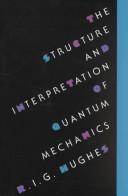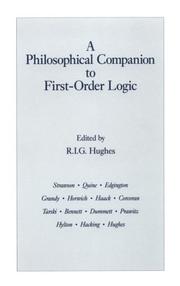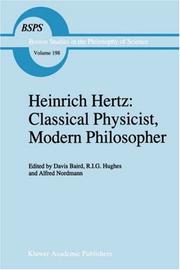| Listing 1 - 6 of 6 |
Sort by
|

ISBN: 0674843916 9780674843912 Year: 1989 Publisher: Cambridge (Mass.): Harvard university press
Abstract | Keywords | Export | Availability | Bookmark
 Loading...
Loading...Choose an application
- Reference Manager
- EndNote
- RefWorks (Direct export to RefWorks)
Quantum theory --- Physics --- Philosophy. --- -Quantum theory --- Quantum dynamics --- Quantum mechanics --- Quantum physics --- Mechanics --- Thermodynamics --- Natural philosophy --- Philosophy, Natural --- Physical sciences --- Dynamics --- Philosophy --- Physics - Philosophy.
Book
ISBN: 0191572896 9780191572890 9780199546107 019954610X 0191809829 Year: 2010 Publisher: Oxford ; New York : Oxford University Press,
Abstract | Keywords | Export | Availability | Bookmark
 Loading...
Loading...Choose an application
- Reference Manager
- EndNote
- RefWorks (Direct export to RefWorks)
R.I.G. Hughes explores the theoretical practices that scientists use in doing physics. He offers a critical examination of accounts that notable physicists give of their practices, and investigates the roles of laws, disunities, models and representation, and computer simulation.
Physics --- Essays. --- Collected papers (Anthologies) --- Papers, Collected (Anthologies) --- Prose literature --- Festschriften --- Philosophy. --- Science

ISBN: 0872201821 Year: 1993 Publisher: Indianapolis (Ind.): Hackett
Abstract | Keywords | Export | Availability | Bookmark
 Loading...
Loading...Choose an application
- Reference Manager
- EndNote
- RefWorks (Direct export to RefWorks)
Book
ISBN: 0262269287 0585342008 9780585342009 9780262269285 Year: 1990 Publisher: Cambridge, Mass. MIT Press
Abstract | Keywords | Export | Availability | Bookmark
 Loading...
Loading...Choose an application
- Reference Manager
- EndNote
- RefWorks (Direct export to RefWorks)
These original essays explore the philosophical implications of Newton's work. They address a wide range of topics including Newton's influence on his contemporaries and successors such as Locke and Kant, and his views on the methodology of science, on absolute space and time, and on the Deity. Howard Stein compares Newton's refusal to lock natural philosophy into a preexisting system with the more rigid philosophical predilections of his near-contemporaries Christian Huygens and John Locke. Richard Arthur's commentary provides a useful gloss on Stein's essay. Lawrence Sklar puzzles over Newton's attempts to provide a unified treatment of the various real quantities: absolute space, time, and motion. According to Phillip Bricker's responding essay, however, the distinctions Sklar draws do not go to the heart of the debate between realists and representationalists. J.E. McGuire and John Carriero debate Newton's views of the relationship between the Deity and the nature of time and space. Peter Achinstein looks at the tension between Newton's methodological views and his advocacy of a corpuscular theory of light; he suggests that Newton could justify the latter by a weak inductive inference, but R.I.G. Hughes believes that this inference involves an induction Newton would be unwilling to make. Immanuel Kant's critique of Newton's view of gravity is discussed and amplified by Michael Friedman In response, Robert DiSalle raises a number of problems for Friedman's analysis. Errol Harris and Philip Grier extend the discussion to the present day and look at the ethical implications of Newton's work.
Mechanics --- Celestial mechanics --- Science --- Engineering & Applied Sciences --- Applied Mathematics --- Natural science --- Natural sciences --- Science of science --- Sciences --- Classical mechanics --- Newtonian mechanics --- Physics --- Dynamics --- Quantum theory --- Gravitational astronomy --- Mechanics, Celestial --- Astrophysics --- Early works to 1800 --- Philosophy --- Newton, Isaac,
Book
Abstract | Keywords | Export | Availability | Bookmark
 Loading...
Loading...Choose an application
- Reference Manager
- EndNote
- RefWorks (Direct export to RefWorks)

ISBN: 079234653X 9048148812 9401588554 Year: 1998 Volume: 198 Publisher: Dordrecht ; Boston ; London Kluwer Academic
Abstract | Keywords | Export | Availability | Bookmark
 Loading...
Loading...Choose an application
- Reference Manager
- EndNote
- RefWorks (Direct export to RefWorks)
The sub-title of this symposium is accurate and, in a curious way, promises more than it states: Classical Physicist, Modem Philosopher. Heinrich Hertz, as the con summate experimentalist of 19th century technique and as brilliant clarifying critic of physical theory of his time, achieved one of the fulfilments but at the same time opened one of the transition points of classical physics. Thus, in his 'popular' lecture 'On the Relations Between Light and Electricity' at Heidelberg in the Fall of 1889, Hertz identified the ether as henceforth the most fundamental problem of physics, as the conceptual mystery but also the key to understanding mass, electric ity, and gravity. Of Hertz's demonstration of electric waves, Helmholtz told the Physical Society of Berlin: "Gentlemen! I have to communicate to you today the most important physical discovery of the century. " Hertz, philosophizing in his direct, lucid, pithy style, once wrote "We have to imagine". Perhaps this is metaphysics on the horizon? In the early pages of his Principles of Mechanics, we read A doubt which makes an impression on our mind cannot be removed by calling it metaphysical: every thoughtful mind as such has needs which scientific men are accustomed to denote as metaphysical. (PM23) And at another place, concerning the terms 'force' and 'electricity' and the alleged mystery of their natures, Hertz wrote: We have an obscure feeling of this and want to have things cleared up.
Physicists --- -Physics --- -Natural philosophy --- Philosophy, Natural --- Physical sciences --- Dynamics --- Physical scientists --- Biography --- History --- -Hertz, Heinrich --- Hertz, Heinrich --- -Influence --- Physics --- Biography. --- -Biography --- Influence --- 19th century --- Germany --- Natural philosophy --- Hertz, Heinrich, --- Hertz, Heinrich Rudolf, --- Hertz, H. --- Influence. --- Philosophy and science. --- History. --- Physics. --- Philosophy of Science. --- History, general. --- History and Philosophical Foundations of Physics. --- Annals --- Auxiliary sciences of history --- Science and philosophy --- Science
| Listing 1 - 6 of 6 |
Sort by
|

 Search
Search Feedback
Feedback About UniCat
About UniCat  Help
Help News
News